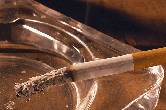
TUESDAY, May 1 (HealthDay News) — Many asthmatic children in the United States are exposed to secondhand tobacco smoke and suffer health problems because of it, a new study shows.
“National asthma guidelines have advised avoidance of environmental tobacco smoke for patients with asthma for decades, but it is unclear to what degree these recommendations are being followed and what the impact of exposure has been in an era of increased awareness of the effects of environmental tobacco smoke exposure,” study author Dr. Lara Akinbami, medical officer at the National Center for Health Statistics of the Centers for Disease Control and Prevention, said in an American Academy of Pediatrics news release.
The researchers analyzed data from the National Health and Nutrition Examination Survey from 2003 to 2010 for 972 children aged 6 to 19 with asthma. The results showed that 53 percent of the children were exposed to secondhand tobacco smoke.
After adjusting for differences in age, sex, race and poverty status, the researchers found that exposure to secondhand smoke was associated with an increased risk of having three or more visits to a doctor or emergency room due to wheezing in the past year; sleep disturbed by wheezing one or more nights a week; and exercise limitations because of wheezing.
There was no significant association between secondhand-smoke exposure and missing school or work because of wheezing or wheezing during exercise.
The study was scheduled for presentation Monday at the Pediatric Academic Societies’ annual meeting in Boston.
“Although this advice is certainly not new, discussing avoidance of environmental tobacco smoke with asthma patients remains critical,” Akinbami said. “New tools are needed to help families achieve the goal of reducing exposure, both inside the home and in other environments.”
Data and conclusions presented at medical meetings should be considered preliminary until published in a peer-reviewed medical journal.
More information
The American Academy of Otolaryngology — Head and Neck Surgery has more about secondhand smoke and children.

